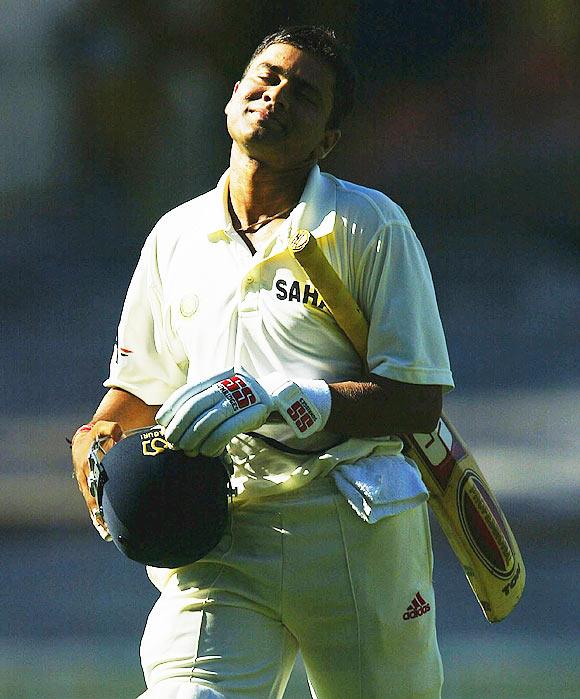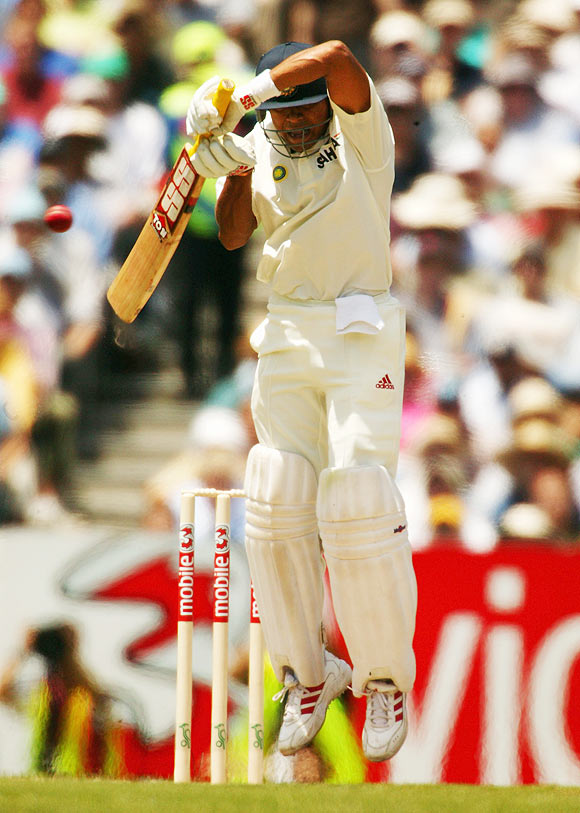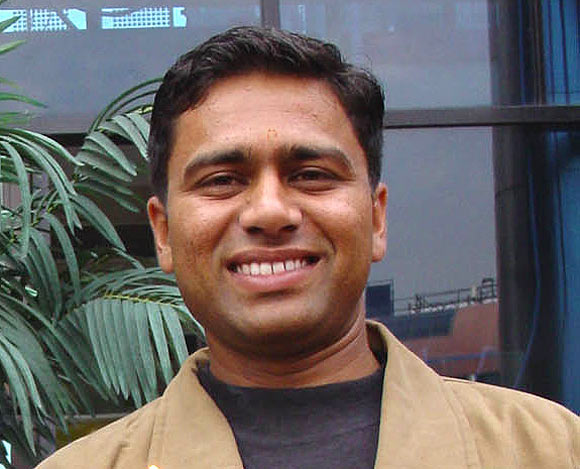Photographs: Getty Images
Aakash Chopra talks to Bikash Mohapatra about Rajasthan's Ranji Trophy triumph, the domestic format and India's dismal showing in the Test series Down Under.
Aakash Chopra is one of the most important figures on the domestic scene. The classical opener was a vital cog in the Rajasthan team that won the Ranji Trophy the last two years.
An aggregate of 615 runs in nine matches (@ 43.92) this season underlined the veteran batsman's contribution to the cause.
The 34-year-old is also an astute observer of the game. His book, Beyond the Blues, released in 2009, is a detailed account of his many observations and makes for an interesting read.
Though his Test career was limited to 10 matches, he continues to score big in domestic competition.
In an exclusive conversation with Bikash Mohapatra, Chopra opens up about the twin triumphs, his time with Delhi, the highly criticized domestic format and the aftermath of the Indian disaster Down Under.
'Many expected us to win'
Photographs: Getty Images
Has the feeling of back-to-back wins sunk in? What, according to you, is the main difference in Rajasthan's Ranji Trophy triumph this year vis-a-vis 2010-11?
The first one was straight out of the blue. But this time we started out as the favourites; many expected us to win!
But it didn't start in the way we expected. It wasn't easy after the first few matches. We were staring at relegation. At one stage we had almost given up.
The game against Saurashtra gave us hope.
I would say our season can be divided into two parts: the first few games, when we struggled, and the last five, when we found our way out.
From our last five games, three of them were outright wins. Looking back at our campaign this term, it gives us a great feeling.
'I am happy that I have contributed to the team's cause'
Photographs: Getty Images
Having played for Delhi for a bulk of your career, you have achieved more success in these last couple of years with Rajasthan. How do you differentiate your stint with the two teams?
The biggest difference is, for Delhi you are expected to win, regardless of what you did in the previous season. Apart from Mumbai (39 wins), Delhi is a team with a huge number of titles (seven).
Having said that, we were not really up to expectations. We only won once (the 2007-08 season) in my 11 years in the team.
With Rajasthan, we weren't expected to win. So it is a special feeling.
As a batsman, which of your knocks this season was the most satisfying?
Actually, it is very difficult to say.
My first century of the season (135) came against Uttar Pradesh, in a match in which we were asked to follow-on. It helped us avoid defeat.
Then there was the 98 against Saurashtra in Jaipur. It was a special knock, even if I missed the hundred by two runs.
Then, there was the game against Hyderabad. It wasn't an easy wicket to bat and we were down at 120 for five at one stage. My contribution (142) helped us reach 421, which eventually was good enough to enforce the follow-on.
Contributing in the final (Chopra scored 94 in the first innings) was also special.
Overall, I am happy that whenever I scored runs it contributed massively to the team's cause.
'I think our win is a lesson for the bigger teams'
Photographs: Getty Images
Following the debacle Down Under, many are questioning the significance of domestic tournaments, like the Ranji Trophy, in present times. Your take on the issue?
Whether it is still a significant tournament or not is for purists to decide.
For those playing, it is the premier domestic tournament. It is the best thing that could have happened to us (the Rajasthan team).
How it is being perceived has very little to do with how we feel.
I think our win is a lesson for the bigger teams. It would make them take the Ranji Trophy more seriously. Teams like Delhi, Bengal and Karnataka can take inspiration from us.
The wickets used in domestic cricket have also come in for a lot of criticism...
The tracks have, more or less, been the same.
Fortunately, for me, when I was playing for Delhi we had a pace attack. We had a dearth of spinners and had to prepare a wicket to suit our bowlers.
The same was the case when I started playing for Rajasthan. Ours is a seamers-dominated attack as well.
But states which have spinners in their ranks prefer turning tracks. The sides which rely on their batting love flat wickets.
This is unfortunate, but true. We need to have more sporting, result-oriented wickets.
Many Ranji teams are happy getting points on the basis of the first innings lead and don't go for a result. Do you think it is the correct approach?
Not at all!
We need to overhaul the points system completely. The rules are archaic. It is about time we wring in a few changes.
At present, teams are more than happy to settle for a draw. The focus is more on securing the first innings lead. It is unfortunate!
We need to put more emphasis on outright wins.
'If you can't play for five full days, nothing more needs to be said'
Photographs: Getty Images
You were part of the Indian team that achieved its best result ever in Australia -- by drawing a Test series. What is the major difference between that team and this, which has been drubbed?
The only difference is the number of runs.
Whenever we have traveled abroad, if our batsmen have put the runs on the board, our bowlers have more or less responded.
But if you can't play for five full days, nothing more needs to be said.
This was the best possible team sent. So where did we go wrong?
We couldn't have sent a better team. I think, after England, the writing was on the wall. But we chose not to read it.
The failure in England was deemed unfortunate. It was blamed on injury-worries, bad luck, what not. We needed to take corrective measures thereafter, which we obviously did not.
Eventually, it is about how you want to play.
From Melbourne, we played identical in all the matches. We didn't learn from our defeats, never made the changes we needed to make.
'It is not just about replacing a few individuals'
Photographs: Getty Images
In a country like ours, where criticism is never taken in the correct spirit, do you think something positive will come out of this disaster? Or such a backlash is unnecessary?
Let's hope so. I am a little disappointed with the public reaction, though.
Emotions are raw; people are livid!
We believe retiring a few individuals would change everything; that's a wrong approach. Rolling heads won't lead to anything. It is important to be a lot more objective and digging a little deeper while handling this issue.
It is about getting into the depths of the problems plaguing Indian cricket and finding a means of correcting it.
It is not just about replacing a few individuals but much more.
I am sure once the emotions settle down we would get to a more logical approach.







Comment
article